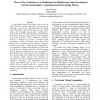Free Online Productivity Tools
i2Speak
i2Symbol
i2OCR
iTex2Img
iWeb2Print
iWeb2Shot
i2Type
iPdf2Split
iPdf2Merge
i2Bopomofo
i2Arabic
i2Style
i2Image
i2PDF
iLatex2Rtf
Sci2ools
HICSS
2000
IEEE
2000
IEEE
Peer-to-Peer Valuation as a Mechanism for Reinforcing Active Learning in Virtual Communities: Actualizing Social Exchange Theory
As knowledge becomes the primary focus of work in many industries, virtual communities and groups are emerging as part of new organizational forms. Within these virtual forms, efficacy of learning in group problem solving and knowledge sharing tasks is influenced by factors such as the level of participation and domination, the level of consensus and cooperation, and satisfaction with group processes. Active collaborative filtering, however, is limited in its ability to motivate active participation. Further, literature reports that virtual discussions are frequently faced with the ‘cold-start’ problem. In this paper, we apply Social Exchange Theory as a foundation to address these limitations. We posit that by applying the insights provided by Social Exchange Theory, member perceptions of the costs and benefits of participating in the virtual group can be modified over time. By providing active feedback to each member, we can influence his/her behavior and willingness to contribu...
| Added | 31 Jul 2010 |
| Updated | 31 Jul 2010 |
| Type | Conference |
| Year | 2000 |
| Where | HICSS |
| Authors | Amrit Tiwana, Ashley A. Bush |
Comments (0)

